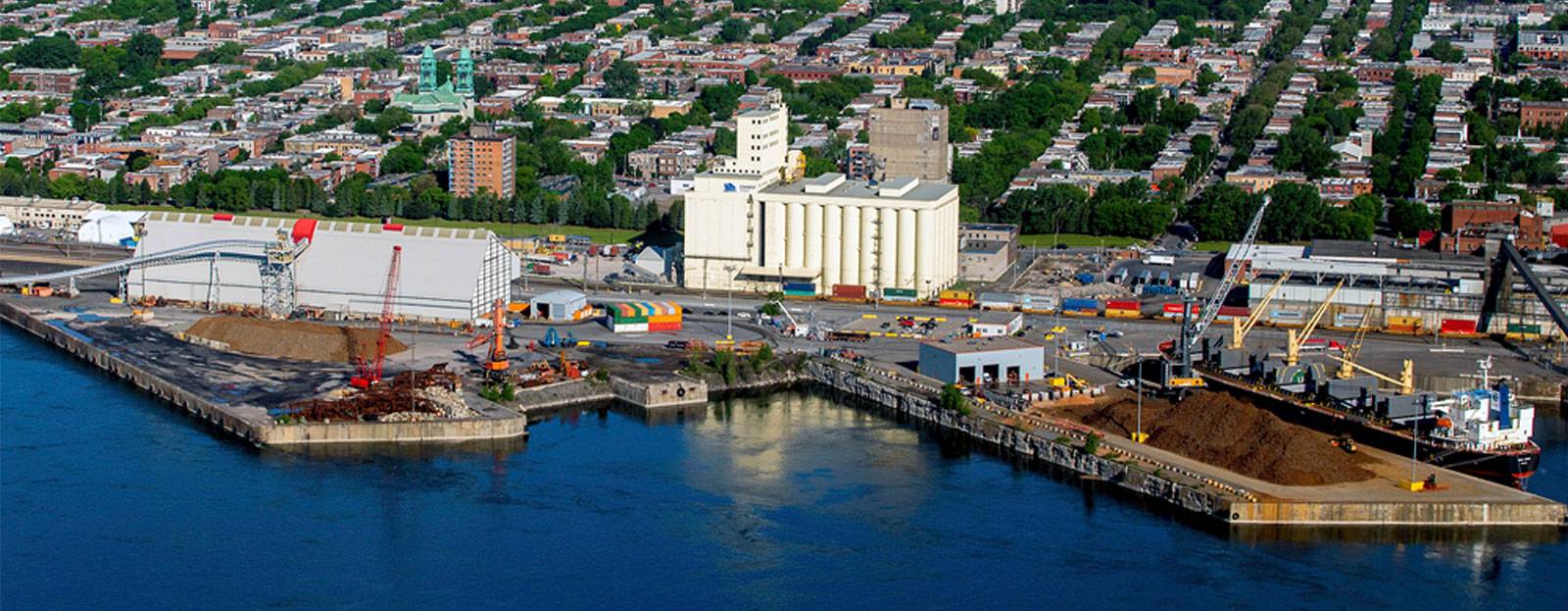
By Andrew Joseph, Editor
The Port of Montréal recently received $8 million in grant monies from the Government of Canada.
The Honourable Omar Alghabra, the federal Minister of Transport, announced that the government is investing the money to help DG CanEst Transit Inc., which has 91 concrete silos at the port, with each having a storage range of 300 to 900 tonnes providing a combined storage capacity of 68,000 tonnes.
The funding comes from the federal National Trade Corridors Fund, a merit-based program designed to help infrastructure owners and users invest in the critical transportation assets that support economic activity in Canada.
Federal Budget 2022 provided $450 million over five years, starting in 2022-23, to support supply chain projects through the Fund to ease the movement of crops, materials, and products across Canada’s transportation networks. The $450 million adds to the program’s funding, bringing the total allocation to $4.6 billion over 11 years (2017-2028).
DG CanEst Transit will undertake the project, worth $18 million. When completed, it will increase the number of containers stored on site, improve the quality of the grain-cleaning service, optimize traffic flow in the yard, and increase capacity for loading and handling containers. This will ensure that critical Canadian goods, like grain and other agriproducts, can continue to be shipped reliably for import and export.
The project seeks to improve the company’s output. It currently has the following:
- An unload rate of rail cars at 350 mt/hour;
- Receiving capacity of more than 100 railcars;
- Serviced by both CN and CP railroads;
- Truck receiving capacity of 350 mt / hour;
- The container filling system is designed for eight containers per hour, with double capacity options.
On October 6, 2022, Alghabra received a report from its Supply Chain Task Force. It noted that the high volume of containers arriving at Canadian ports has clogged the transportation supply chain due to insufficient warehousing and reduced trans-loading capacity.
The funding will allow DG CanEst Transit to address capacity constraints and relieve infrastructure pressures at the Port of Montréal terminal.
“Specifically, the funds will allow for new equipment here at the grain terminal,” said Alghabra during the announcement, “increasing the number of containers stored on site.
“It will also improve the flow of traffic in the yard and increase capacity for loading and handling containers.”
Annie Koutrakis, the Parliamentary Secretary to the Minister of Transport, added, “We must continue to work towards well-functioning supply chains. Canada’s ports are important supply chain hubs, connecting coastlines to inland markets where goods are shipped by railway and trucks. This funding for DG CanEst Transit… will help build more resilient and efficient supply chains.”
According to DG CanEst Transit’s website, the terminal’s current container-filling design system allows for about eight containers per hour.
The project will also add 50 full-time jobs at DG CanEst Transit’s plant and in its transportation division.
The investment by the Government of Canada in the Port of Montréal upgrades is a means to ensure the country’s supply chains are efficient and dependable to support economic growth in Quebec and across Canada, create good jobs, and address the rising cost of living.
This investment is good news for Canadian farmers.
Statistics Canada data suggests farmers will rebound from 2021 with larger harvests of canola, barley, soybeans, corn, and wheat in 2022, and is able to better move crops to customers on time will help the ag sector as a whole.
The Honourable Marie-Claude Bibeau, Canada’s federal agriculture minister, said investing in ag infrastructure will allow Canada to continue to be a reliable trading partner.
“The entire world looks to Canada to support food security around the globe. Port infrastructure is critical for the continuous flow of commercial trade, and our government will continue to support initiatives like CanEst Transit as they help export Canadian agricultural products,” Bibeau explained in a statement.
Marc-Aurel Clapperton, the General Manager of DG CanEst Transit, called the investment in his company’s project a significant milestone for the Canadian agri-food industry.
He said that the past two years (of Covid-19 economics) have proven how vital proper supply chain management is. It has deepened DG CanEst Transit’s commitment to streamlining its export processes better.
“We are honoured to be entrusted with funding that will not only improve our infrastructure and capacity to serve both established and emerging markets around the globe but will also continue to showcase Canada’s unparalleled contributions and growth to the agriculture-based economy,” he explained.
Martin Imbleau, the President and Chief Executive Officer of the Montréal Port Authority, said he was happy with the financial investment by both DG CanEst Transit and the Government of Canada. He acknowledged that once the project is complete, a positive impact will trickle down the supply chain and onto all the farms across Canada.
“Support from the Government of Canada enables the Port of Montréal’s ecosystem to become more efficient, benefiting all the communities we serve from our facilities,” summed up Imbleau. In the end, everyone wins.”

